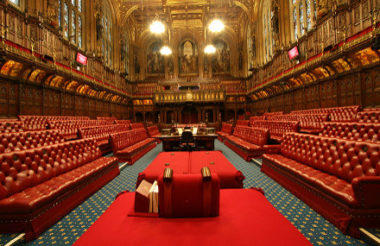Peers have criticised the government’s attitude to charities during a debate in the House of Lords yesterday.
During a debate to consider the recommendations from the House of Lords Select Committee on Charities peers criticised the government for taking ten months to respond the committee. They also criticised the lack of commitment to action when it did respond, and the delay in appointing the next chair of the Charity Commission.
In response the government apologised for the delays, which it blames on the election and subsequent reshuffle, and said that recommendations in the report are being taken seriously.
‘Lukewarm response to report’
Baroness Jill Pitkeathley, who chaired the committee, said she was disappointed by the brevity government’s response and questioned why it had taken so long.
The committee published its report in the spring and the government took ten months to respond.
Opening the debate she said: “I am bound to say that when committee members read [the government response], their most frequent reaction was, ‘What on earth took you so long?’. The government’s response to the committee’s inquiry addresses its recommendations point by point, it is true, but most recommendations are dealt with only briefly.”
She said that there is “little reference to the specific challenges” the charity sector faces, that it “lacks a sense of co-ordination regarding how the government, and particularly the Office for Civil Society, plan to respond to some of the challenges and opportunities the sector faces” and that it is “largely focused on actions that the Government have already taken or are considering through a proposed civil society strategy”.
She said there was some “consolation” in the announcement that a new civil society strategy was in the works, but called for further details.
Lord Rooker, a Labour peer who was on the committee, described the response as “lukewarm”.
Another Labour peer, Baroness Warwick, said it was “bland” and criticised the government for not acting on the recommendation that people should be able to take time of work for trustee responsibilities.
“This would rightly put trustees on a par with school governors and magistrates. It would be a really positive step towards greater diversity and take-up of board places, it would promote trusteeships to employees, and give greater recognition to trustee roles when recruiting and promoting staff,” she said.
Lack of Charity Commission announcement
Pitkeathley also raised concerns about how long it is taking to appoint the next chair of the Charity Commission, with William Shawcross’s term ending in two weeks’ time.
She said the lack of information from the government about who would replace him is “undermining” for the both the regulator’s staff and the wider sector.
“It is understood that the names of suitable candidates were approved by the DCMS at the beginning of December and passed to Number Ten some four weeks ago at least," she said. "Still no announcement has been made. This is extremely undermining for the Commission’s staff and, of course, unsettling for the whole sector, as this is a most significant appointment for charities.”
She asked whether this is because “the appointment is seen as insufficiently important” or “is some kind of political influence perhaps being exerted?”
It has been rumoured that former minister for civil society, Rob Wilson, was among the six candidates interviewed for the role, and Pitkeathley added that the new chair “must, above all, be totally neutral politically”.
‘Charities need core costs’
A number of peers also spoke about the importance of core costs for chariites, including Baroness Prosser, Labour.
She said: “The government’s mantra regarding reduction of back-office costs is seriously misplaced. Of course, no one should tolerate waste, but this discussion is conducted as though back-office costs were a luxury and bore no relation to the work of an organisation overall. Charities need secure core costs.
“Front-line staff cannot do their jobs effectively or efficiently without the day-to-day work of administrative and support staff. The irony of the government’s argument does not escape me when I meet with ministers who are always accompanied by a phalanx of civil servants and advisers—back-room staff writ large.
Government response
Baroness Chisholm of Owlpen spoke on behalf of the government and began with an apology for the delay in the government response.
“I apologise that we were able to publish our response to the report only just before the Christmas recess, and I know that this has upset many noble lords who have spoken in the debate. This was due in part to the ministerial changes resulting from the general election and in part to ensure that our response could dovetail with our plans for the development of the civil society strategy,” she said.
She paid tribute to the sector and the “sheer amount of good work”, and also to the royal family for its support charities and to William Shawcross, but could not offer any update on his successor.
“The new chair of the Charity Commission will be announced in due course. I know that that is a maddening thing to say but in this case 'in due course' means really shortly,” she said. “The new chair will be the best person for the role and will be expected to be independent and impartial.”
She also said that the issue of core costs will be discussed as part of the civil society strategy.
“Our civil society strategy will provide a clear vision for the government’s work with and for civil society. The strategy will reaffirm the value that we place on civil society and explore what more we can do to support its work in building a stronger and fairer society. It will be developed through open dialogue and debate,” she said.
She also sought to reassure peers that their report was being taken seriously.
“All speeches today have mentioned the fact that your lordships feel that the government have not responded properly and have taken a long time to do so. All I can say is that in the short time I have been involved in this our minister, Tracey Crouch, feels very strongly about it.
“From the meetings I have been in at DCMS, this really is at the forefront of the department’s thinking. The speeches that we have heard today mean that I can take some really powerful things back to the department, which I assure the house I will do.”
Related articles












